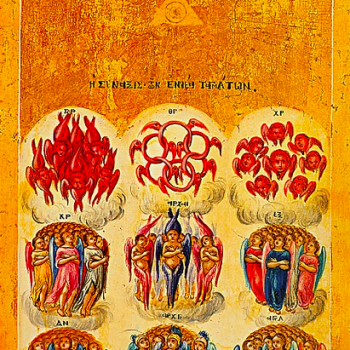Vade Retro
I sure amn’t! Let’s talk about him.
To start: I have only the vaguest idea of who William Wolfe is. (In fact, when I wrote my first draft of this post, I included some info that was apparently about an entirely different Wolfe.) I gather he was some sort of official in the Trump administration? At its best, I find nationalism terrifically boring,1 and I have nothing but disgust for anyone who willingly involved themselves with Donald Trump’s presidency,2 so I’m not likely to retain this stuff. Anyway. Apparently Wolfe is a self-professed Christian nationalist, and, judging from the three or four tweets of his I’ve unwillingly stumbled over, he seems true to type. Here he is on Twitter the day before yesterday, illustrating one of the things that makes Christian nationalism so thoroughly opaque to me.

I’ve written a good deal here about nationalism, fascism, anti-fascism, and so on. I don’t know if I’ve really gone into how this stuff clashes with the gospel, though; I tend to take that part for granted, because to me, it seems so obvious that an explanation would feel insulting. But, when you pause to think about it, that’s not really fair. Everybody learns about something for the first time on some specific occasion; that occasion might be right now. Besides, it’s not like it’s the first century any more. With all the practical and even theological allowances the Church grants to the world—Christians can be state officials; Christians can join the military; Christians can, I kid you not, work in finance. Is nationalism really so different?
Yes. Let’s unpack why.3
To Judge the Quick and the Dead
To start with, where does this kind of faith put the Second Coming? Not to sound like a Left Behind fan, but I feel like the Second Coming is kind of a “thing” in Christianity. The living and the dead are judged not for what prestige they had, or even what goals they achieved, but simply and plainly for the good and evil they did. True, Wolfe says “win in an ugly manner” and “do what it takes to win.” That is technically different from saying “Let us do evil that good may come.” Evil is a different word—got its own spelling and everything.
But come now. Is there anybody who honestly doubts that what he’s talking about is stuff like threatening opponents, running smear campaigns, applying rules hypocritically, manipulating people’s anger and fear, trafficking in bribes, breaking your word—in short, the sort of things people usually mean by saying “an ugly manner” and “what it takes to win”? What else could he mean? What else has this cant meant for the past seven years? If there’s another explanation, I would in all seriousness be glad to hear it.
That aside: how exactly do you plan to explain that kind of conduct on the Last Day? Surrendering to a humiliating death and then coming back miraculously was good enough for God made flesh, but I guess this particular election was just too important for that sort of thing?
Or were you, perhaps, not entirely confident that God would want to resurrect the political cause you care about so much? There are lots of reasons one might be unsure of that. For instance, the thing that’s nearest and dearest to your political heart might not, in fact, be in the Bible (doubtless due to some oversight on the part of the compilers). Or perhaps it is there, yet the Bible seems to take a thoroughly unsavory attitude toward it. Perhaps Scripture casually ignores something you consider terribly important, or takes something you consider precious and depicts it as an idol and a danger.

Sympathy for the
Alright, alright, I’ve been a little cold here, a little sarcastic. But the truth is, I get it. I sympathize completely. The Bible is a colossally inconsiderate book, and it’d be a lie to say it only fails to consider the feelings of neocons. Scripture ignores my feelings all the time. I don’t want to be chaste; I’d much rather go to bed with every man I find hot or even warmish. I don’t like forgiving my enemies; sneering at them is more fun.4 I don’t want to give my money to panhandlers—they’re annoying, and worse, often chatty; I want to spend that money, and that time and attention, on me and the things that I’m interested in.
Now yes, obviously the paragraph above is bait. Phrase it as blatantly as this, and nobody5 is going to claim Christianity validates my desire to be a selfish, mildly ornery slut. But it will tell me that it’s natural to long for attention and affection; it will tell me that forgiveness is a hard duty, and I shouldn’t be too hard on myself when I find it tough to fulfill; it will tell me that I have a right to use some of my income not only on necessities like food and clothing, but on little perks here and there. That’s all true.
Non Tollit Naturam, Sed
Not only is it true, it’s necessary to be healthy, psychologically speaking. A person can go without intimacy or ego security or candy for a while—the history of asceticism shows that highly motivated people can do it for years on end. But you still need to recognize those impulses as normal to stay healthy. If you start thinking of normal appetites as in themselves pathological, you’re eventually going to hurt yourself. Your warped definition of health has put you on a collision course with what health actually is; sooner or later, one of the two vehicles—the reality of health, and your idea of it—is going to crash irreparably.
Think of it like this. A person might reconcile themselves to having a finger amputated, in order to stop the spread of gangrene. Nobody likes losing a finger, but, under the circumstances, accepting it is necessary; that’s fine. But a general outlook of “Fingers are subject to rot! Get rid” is, well, rotten.

There’s a famous saw in Catholicism, pithily put by St. Thomas: Gratia non tollit naturam, sed perficit, or “Grace does not displace nature, but completes it.”6 This steers us away from excessive rigor, which tends to treat human nature itself as bad (in which case, why would God redeem us at all?) and is a very common beginner-level mistake in the spiritual life! I complain sometimes about the overuse of this slogan, but really, in its proper context, it’s excellent. But there is a catch in it.
Med Bay
Gangrene is a disease of rot. You could call “direct” cell death if you liked. Any disease, unchecked, could in theory lead to total system shutdown, and thus to death; but gangrene isn’t playing the long game. It’s got some cells right here, right now, and it’s having a ball making them dead. Ugly, yes, but clear.
However, there’s another disease at “the other end of the spectrum,” so to speak. There is a disease of uncontrolled growth, of mutation run amok, of swelling rather than shriveling; where gangrene kills straightforwardly, this one, in a way, kills cells by pumping them so full of life they burst. And, especially in the early stages, since this stuff looks like life and growth, our immune systems don’t always recognize the real threat it poses.
I’m talking, of course, about cancer.
Footnotes
1Just to be clear, if you ask me to love and serve my country, I’m on board; if I didn’t love my country, I’d have renounced my citizenship years ago. Nationalism is a different beast. Even within the limits of justice and temperance, to me, nationalism is like a pet tarantula: I’m not trying to smash anybody else’s terrarium; I simply and absolutely don’t get the appeal and never will.
2Okay, this isn’t absolutely true. I’m pleased with Justice Gorsuch’s rulings upholding the rights of American Indians to at least some of their land; apparently, he’s one of the few high officials in our history who feels we are more honored by keeping our sworn word embodied in treaties than we are by breaking it. But nobody else springs to mind.
3To be clear once again: I am, a hundred percent, going to argue here that Christian nationalism “ain’t it chief,” and for theological reasons. However, in saying this, I don’t mean that Christian nationalists are somehow less Christian than myself (whatever that would even mean—maybe their baptisms didn’t have enough mana and their spells have stricter range limits). All I’m saying here is that Christian nationalism is stupid; I neither need nor wish to prove that it also falls under the distinct heading of “heresy.”
4Luckily, once you’ve learned to make the mouth noises widely associated with forgiveness, you can sound like you’re forgiving people while actually making fun of them. I haven’t found anything in the New Testament forbidding this, so I assume it’s fine.
5Of my acquaintance. I’m pretty sure.
6You’ll see variants in wording; Latin doesn’t always go neatly into English (translations to or from any language basically always lose a little nuance). The verb tollit ← tollere literally means “to pick up,” from which it derives meanings ranging from “destroy” to “exalt.” The verb perficit ← perficere is a little easier: it comes from facere, whose base meaning is “to make,” but this word functions almost like “to do” in English. The prefix per, “through,” often means something like “thoroughly, completely, all the way”—which is why we ultimately get the word “perfect” from this verb; a thing is perfect if it is “fully made” or “all done,” not lacking anything. Hence, the sequence tollit … perficit has a feel of finishing a project or an artwork rather than exchanging an unfinished piece for something else.












